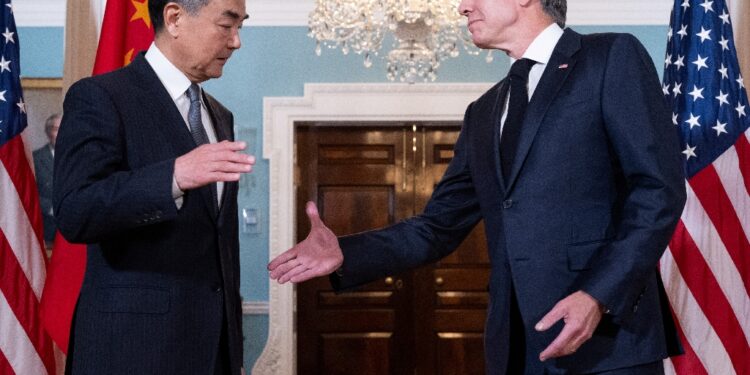US President Joe Biden met China’s foreign minister for talks on Friday as the two countries seek to smooth ties ahead of a possible visit by Chinese leader Xi Jinping.
Biden told top Chinese diplomat Wang Yi that Washington and Beijing must “manage competition in the relationship responsibly and maintain open lines of communication,” the White House said.
With the Israel-Hamas conflict raging in the Middle East, Biden also “underscored that the United States and China must work together to address global challenges,” it added in a statement.
Biden has invited Xi to San Francisco next month for the Asia-Pacific Economic Cooperation (APEC) summit, but he has also stood firm on China in the run-up, keeping up a stream of sanctions and backing US allies in disputes with Beijing.
Wang Yi has been on a two-day visit to Washington during which he also met US Secretary of State Anthony Blinken and Biden’s National Security Advisor Jake Sullivan.
The Chinese foreign minister had been expected to meet Biden too after Blinken met Chinese president Xi in Beijing in June, but it had not previously been confirmed.
White House National Security Council spokesman John Kirby had said on Thursday that this week’s talks were a “milestone in that effort to keep the lines of communication open with the PRC (People’s Republic of China).”
Sullivan was going to raise “areas of concern” including China’s behavior in the South China Sea, where it has been forcefully asserting its maritime boundaries.
Wang said after meeting Blinken on Thursday that he wanted to “stabilize US-China relations” and “reduce misunderstanding” after years of tensions.
Acknowledging that differences will still come up, Wang said China would respond “calmly, because we are of the view that what is right and what is wrong is not determined by who has the stronger arm or the louder voice.”
Biden and Xi have had no contact since a meeting in Bali in November 2022.
Relations have been tense for years between world’s top two economies as they vie for influence in the Asia-Pacific region and beyond, and as Beijing boosts cooperation with Russia in a bid to reduce US dominance.
Tensions have been particularly high over Taiwan, the self-ruling democracy claimed by Beijing that over the past year has launched major military exercises in response to actions by US lawmakers.
The United States and China have also traded barbs over the conflict in the Middle East, where Biden has been Israel’s foremost ally.
US officials have repeatedly spoken of creating “guardrails” with China to prevent worst-case scenarios and have sought, without success, to restore contact between the two militaries.
Biden on Wednesday warned China of US treaty obligations to the Philippines, which said that Chinese vessels deliberately hit Manila’s boats in dispute-rife waters — an account contested by Beijing.
Speaking alongside Australia’s prime minister, a key Asia-Pacific ally, Biden vowed to compete with China “every way according to the international rules — economically, politically, in other ways. But I’m not looking for conflict.”
– Danny KEMP











